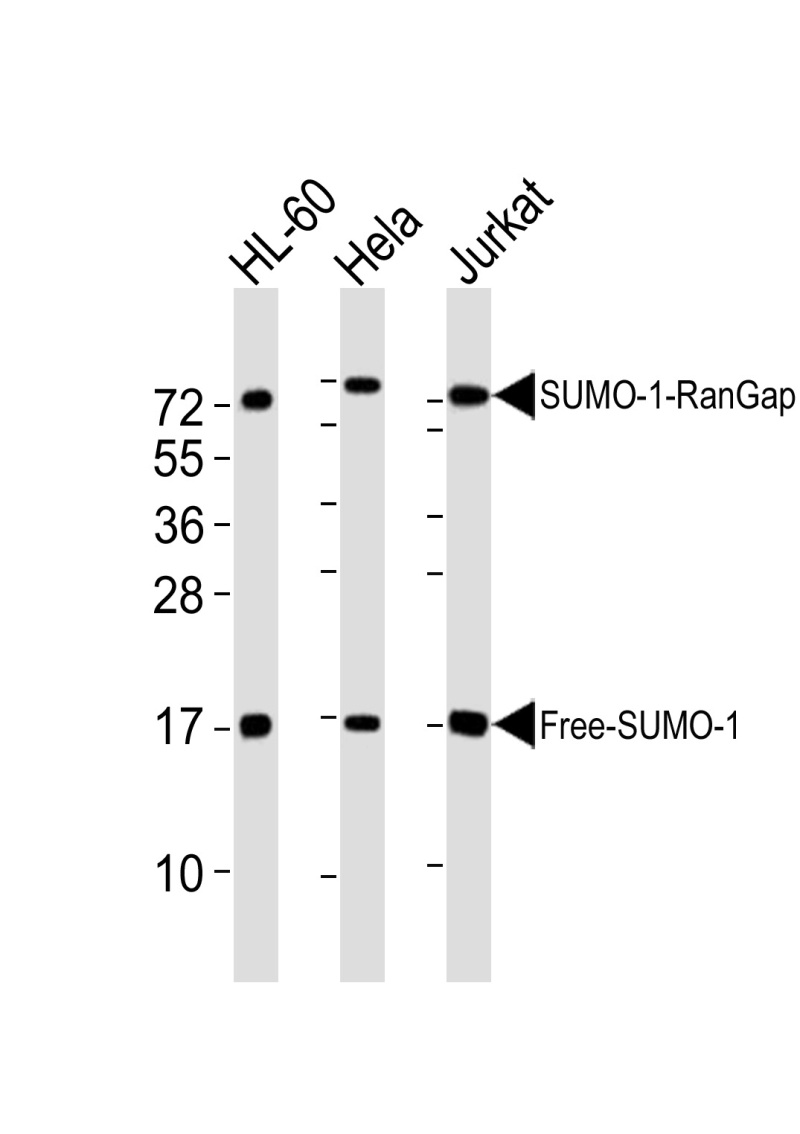
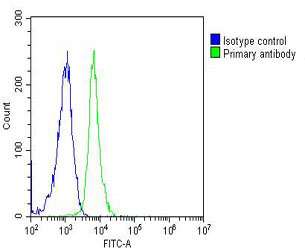
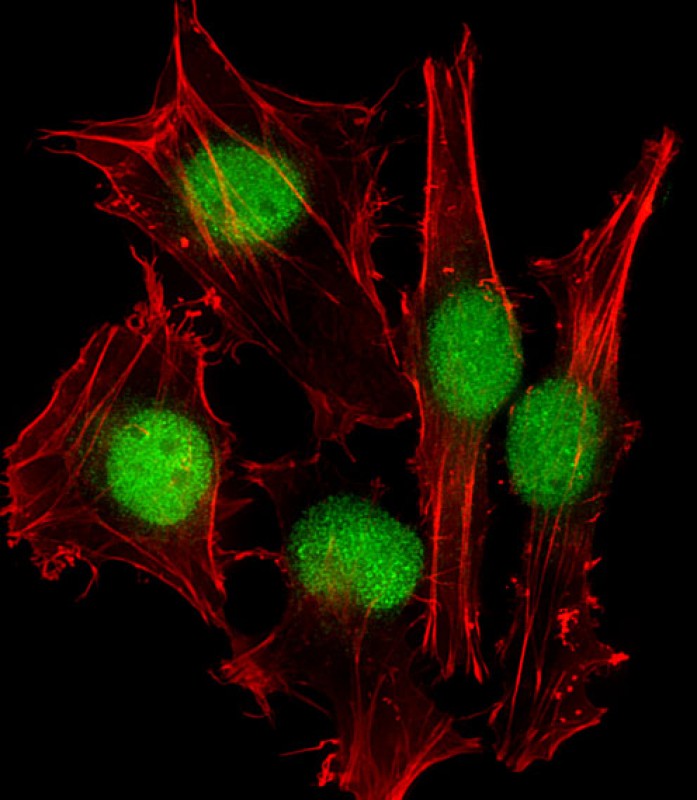
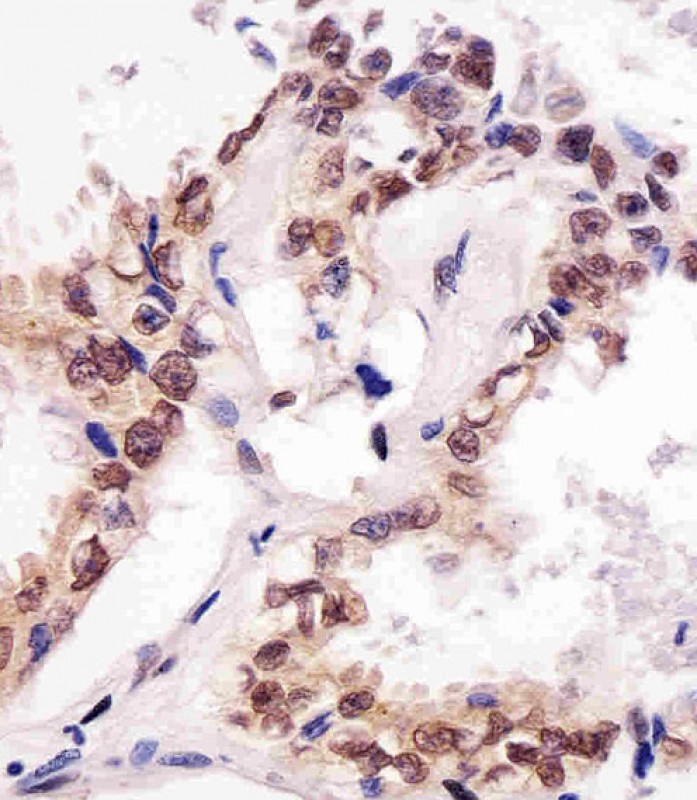
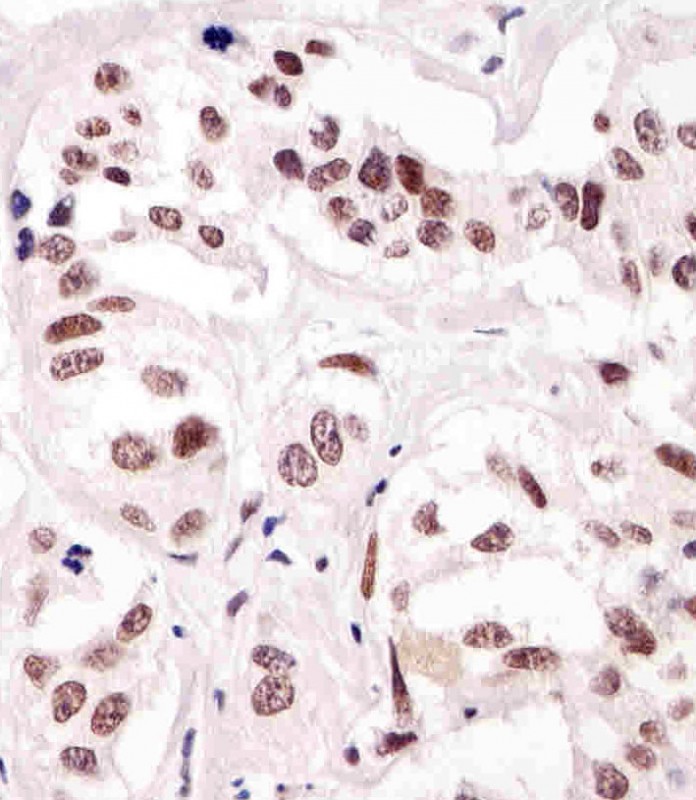
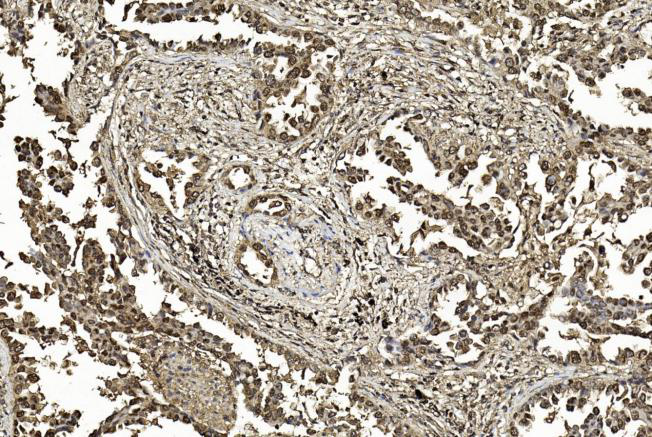
| WB | 咨询技术 | Human,Mouse,Rat |
| IF | 咨询技术 | Human,Mouse,Rat |
| IHC | 1/100-1/500 | Human,Mouse,Rat |
| ICC | 1/25 | Human,Mouse,Rat |
| FCM | 1/25 | Human,Mouse,Rat |
| Elisa | 咨询技术 | Human,Mouse,Rat |
| Aliases | Small ubiquitin-related modifier 1, SUMO-1, GAP-modifying protein 1, GMP1, SMT3 homolog 3, Sentrin, Ubiquitin-homology domain protein PIC1, Ubiquitin-like protein SMT3C, Smt3C, Ubiquitin-like protein UBL1, SUMO1, SMT3C, SMT3H3, UBL1 |
| Entrez GeneID | 7341 |
| WB Predicted band size | 11.6kDa |
| Host/Isotype | Mouse IgG1 |
| Antibody Type | Primary antibody |
| Storage | Store at 4°C short term. Aliquot and store at -20°C long term. Avoid freeze/thaw cycles. |
| Species Reactivity | Human |
| Immunogen | Purified recombinant GST-SUMO1 fusion protein was used as immunogen. |
| Formulation | Purified antibody in TBS with 0.05% sodium azide. |
+ +
以下是关于 **SUMO1抗体** 的3篇参考文献示例,基于公开研究整理:
---
1. **文献名称**:*SUMO modification modulates the transcriptional activity of AML1/Runx1*
**作者**:Yamaguchi, Y.; et al.
**摘要**:研究利用SUMO1抗体通过免疫共沉淀(Co-IP)和Western blot技术,揭示了SUMO1修饰对AML1/Runx1转录因子活性的调控作用,表明SUMO化修饰在白血病相关基因表达中起关键作用。
---
2. **文献名称**:*A role for SUMO1 in viral RNA replication and cellular stress response*
**作者**:Liu, Y.; et al.
**摘要**:通过免疫荧光(IF)和SUMO1特异性抗体,发现SUMO1蛋白在病毒RNA复制过程中被招募至细胞质应激颗粒,提示SUMO1可能参与细胞应激和病毒感染的调控机制。
---
3. **文献名称**:*Characterization of SUMO1-conjugated proteins in the human proteome*
**作者**:Matic, I.; et al.
**摘要**:利用SUMO1抗体进行大规模质谱分析,系统鉴定了人类细胞中SUMO1修饰的靶蛋白,揭示了SUMO化修饰在DNA修复和细胞周期调控中的广泛功能。
---
(注:以上文献信息为模拟示例,实际引用请核对具体论文数据库。)
SUMO1 antibodies are essential tools for studying the post-translational modification process called SUMOylation, which involves the covalent attachment of small ubiquitin-like modifier (SUMO) proteins to target substrates. SUMO1 (small ubiquitin-like modifier 1) is a member of the SUMO protein family, which also includes SUMO2. SUMO3. and SUMO4. Unlike ubiquitination, SUMOylation does not typically mark proteins for degradation but regulates diverse cellular processes such as nuclear-cytosolic transport, transcriptional regulation, DNA repair, and stress responses. SUMO1. in particular, is known for its role in modulating protein localization, stability, and interaction networks.
SUMO1 antibodies are designed to specifically detect endogenous or exogenous SUMO1-conjugated proteins in various experimental applications, including Western blotting, immunoprecipitation, immunofluorescence, and immunohistochemistry. These antibodies are critical for identifying SUMOylation substrates, studying dynamic SUMO1 modification under different physiological or pathological conditions (e.g., cancer, neurodegenerative diseases), and exploring mechanisms of SUMOylation enzymes (E1 activating, E2 conjugating, and E3 ligating enzymes).
Most SUMO1 antibodies are raised against recombinant SUMO1 proteins or synthetic peptides corresponding to unique regions of SUMO1. ensuring specificity and minimizing cross-reactivity with other SUMO paralogs. Validation often includes testing in SUMO1-knockout models or siRNA-mediated knockdown systems. Researchers must consider potential cross-reactivity with free SUMO1 versus conjugated forms, as well as tissue-specific expression patterns, when interpreting results. The development of high-affinity, modification-state-specific SUMO1 antibodies continues to advance research in cellular signaling and disease mechanisms.
×